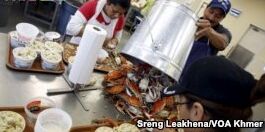正文
没有外来客 马里兰螃蟹生意令人忧心
Olivia Rubio is a seasonal worker on Hooper's Island in the eastern state of Maryland.
She does the difficult work of processing crabs, picking the meat from the sharp shells by hand and putting it into containers.
The valuable seafood is sold across the United States East Coast and beyond.
Hooper's Island is among a group of thinly populated islands in the Chesapeake Bay. The bay is one of the world's largest estuaries and a busy center for seafood production.

Seafood harvesting and processing is what Hooper's Island is known for.
Maryland crab meat producers have used temporary workers there since the 1980s.
These "guest" workers live and are employed in the U.S. for only part of the year. Many American industries depend on these foreign workers.
Rubio has been coming to the island for 15 years from Mexico on an H2-B visa.
"We have the opportunity to come here to work and support our family, help our children move forward, and support our parents. It's good," Rubio said.
Rubio can live and work in the U.S. during the warmer months, when there is work, and return to her home country in the winter.
She is happy to have received a visa for this year, but wonders about next year.
In 2018, the Trump administration gave out some H-2B visas using a lottery system. U.S. Citizenship and Immigration Services, the agency that supervises the visa program, said there was a higher demand this year.
"I hope there are visas to be able to come back and do the work again," said Rubio.
Rubio works for G.W. Hall & Son Seafood. The company needed 40 visas, but only got 30 for guest workers.
Robin Hall is co-owner of the company.
"I don't know what we would do or the whole area would do without them. I mean from the stores to...I don't know how to describe it because of the impact that they have. They keep it all moving."
There are about 20 licensed crab processing businesses in Maryland. They employ 500 foreign workers.
Representative Andy Harris represents Hooper's Island in Congress. He has asked the Departments of Homeland Security and Labor for extra guest worker visas. He said the limit for H-2B visas was reached in January.
That has left many businesses unable to get seasonal workers. Harris said these workers support "thousands of related jobs held by American citizens."
From October 2017 to September of 2018, there were 66,000 H-2B visas available for non-agricultural industries. However, Congress could raise that number.
Businesses worry over lack of workers
Russell Hall Seafood also is on Hooper's Island. But its crab containers are empty. The kitchen is unused and there are no workers to be found.
Harry Phillips is with Russell Hall Seafood. He said the company needed 50 visas, but received none. He said, "It never was this way before. We've done this for 25 years and no doubt some year it's been slow getting workers, but we've always got them."
Phillips says he advertised for jobs in local newspapers.
"We have to actually advertise in newspapers before we're allowed to even apply for the H-2B program workers."
Phillips said no local people have applied. He does not like the lottery system.
"That's a big gamble. I mean, we can't run our business at a gamble, whether we're going to get our workers or not," he said.
AE Phillips and Son also is not operating. The company, established in 1914, is part of the Phillips Seafood restaurant chain.
Morgan Tolley is the company's general manager. He said he is worried about 2019.
Tolley says the H-2B visa should not be linked to other immigration issues.
"Speaking for the H-2B program, which is a non-immigrant work visa, to me personally, that has nothing to do with immigration. It's a non-immigrant work visa. These people take tremendous pride in the fact that they can come here to the United States and work and go home, and they're proud of that right that they have earned."
Robin Hall has about 75 percent of the workers he needs. But he said he wishes all the local companies had workers.
He told VOA that people living on the island are mostly retired and there are almost no local workers.
The concern whether there will be enough workers to process the good-sized catch of crabs expected for Maryland this year.
I'm Mario Ritter.
Aline Barros reported this story for VOA News. Mario Ritter adapted it for VOA Learning English. Caty Weaver was the editor.
- 上一篇

- 下一篇



 手机网站
手机网站